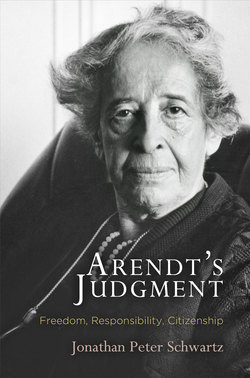Arendt's Judgment

Реклама. ООО «ЛитРес», ИНН: 7719571260.
Оглавление
Jonathan Peter Schwartz. Arendt's Judgment
Отрывок из книги
Arendt’s Judgment
A volume in the Haney Foundation Series, established in 1961 with the generous support of John Louis Haney
.....
In competition with the philosophers, the Greek political actors pursued a very different kind of athanatizein. The tradition of political thought was formulated and structured by the philosophers, and Arendt therefore believed that their contemplative approach to immortalizing had in one way or another framed Western political theories. The problem with this, she argued, was that politics had its own unique and foundational practice of athanatizein, which had nothing to do with contemplation, but instead had to do with action, with free activity in the concrete circumstances of the human world.99 Political actors did not strive to immortalize themselves through contemplation but instead through the performance of great deeds in a public realm where their peers could judge the acts, deciding whether those deeds deserved to become the content of history.100 Thus, the essential characteristic of political action was its concern with the specific kind of immortality that comes from historical greatness in the human world.
However, the historical problem with this uniquely political form of athanatizein was that those who actually lived and took part in this activity—the “men of action,” as she called them—rarely took the time to theorize about it. As a result, most of Western political thought was done by philosophers who disdained the political form of immortalizing and the activities of the men of action.101 Philosophers could not grasp the actors’ obsession with fame and power, since in their view it was “absurd” to think that humans could ever live up to what was highest in the cosmos,102 and came to view political theory, in the words of Pascal, as like “laying down rules for a lunatic asylum.”103 “Hence,” she writes, “the old paradox was resolved by the philosophers by denying to man not the capacity to ‘immortalize,’ but the capacity of measuring himself and his own deeds against the everlasting greatness of the cosmos.”104 Arendt’s political writings were an attempt to provide the fullest articulation yet given of what the Western men of action had actually been doing in their pursuit of immortality.105 To do this, she focused on what she believed were the three originary attempts to achieve political athanatizein in Western politics: the Greeks, the Romans, and the modern revolutionaries.106 Each instance displayed a unique version of political action, contributing formative elements and ideals to Western politics and culture that continue on in our political language.107 Chapter 2 will examine these three different instances of political action. Presently, however, I want to provide a general account of what Arendt understood this political version of athanatizein to involve.
.....